Module 11 Way of life 模块表格式教案(5课时)
文档属性
| 名称 | Module 11 Way of life 模块表格式教案(5课时) | 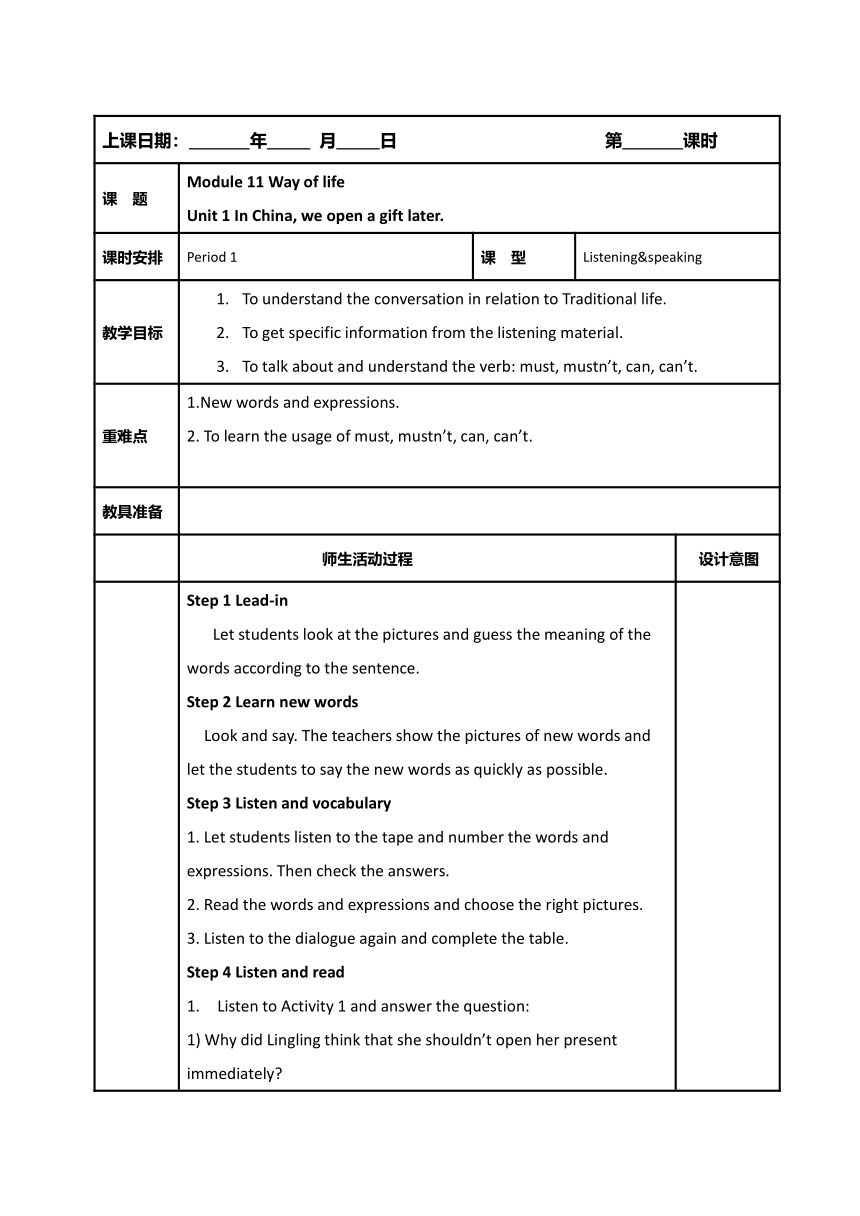 | |
| 格式 | doc | ||
| 文件大小 | 100.5KB | ||
| 资源类型 | 试卷 | ||
| 版本资源 | 外研版 | ||
| 科目 | 英语 | ||
| 更新时间 | 2022-09-27 16:19:38 | ||
图片预览

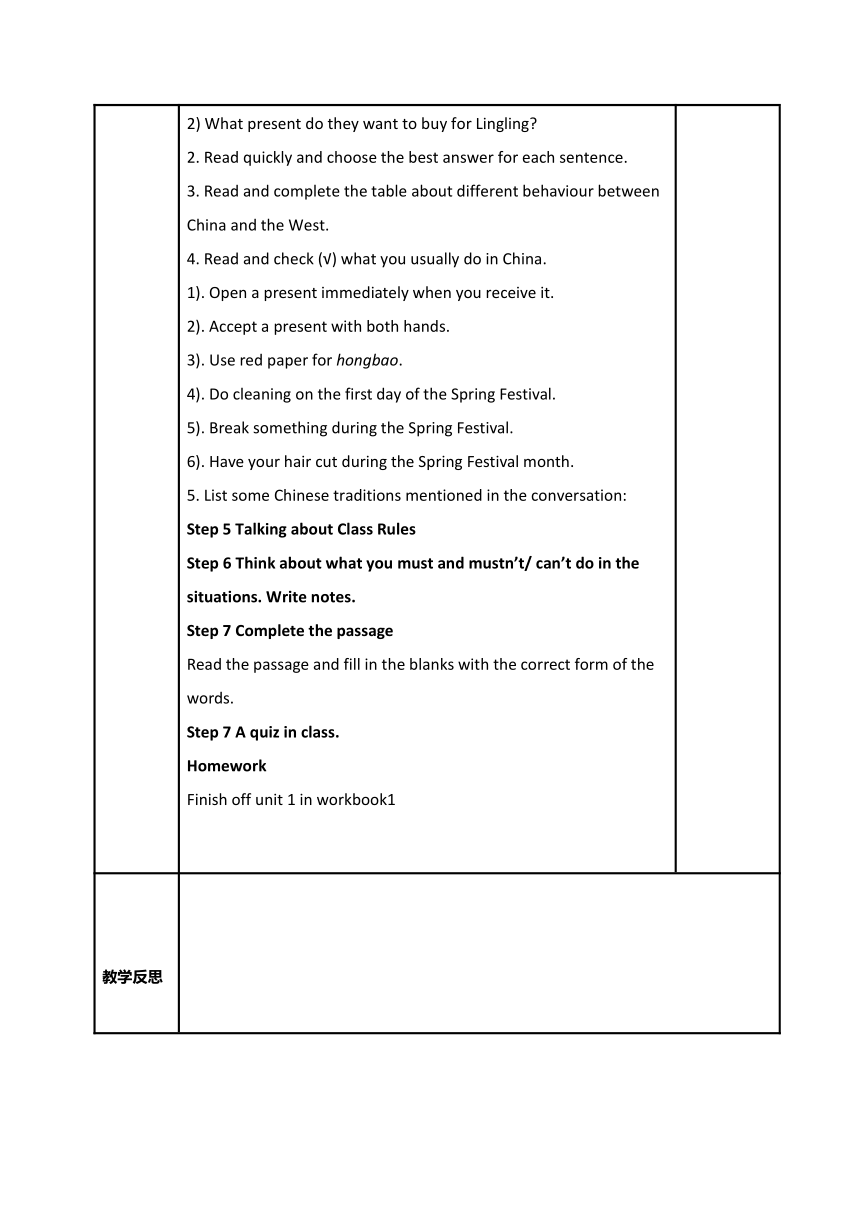
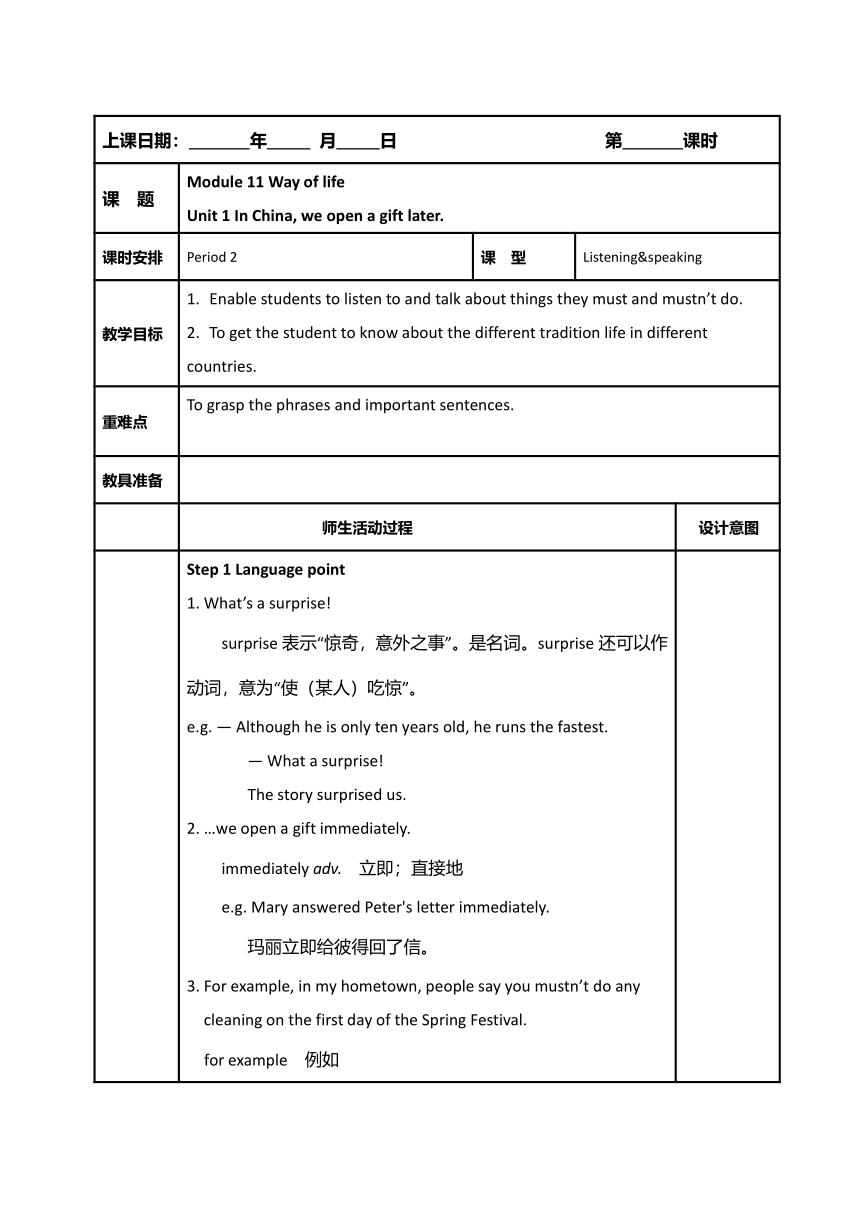
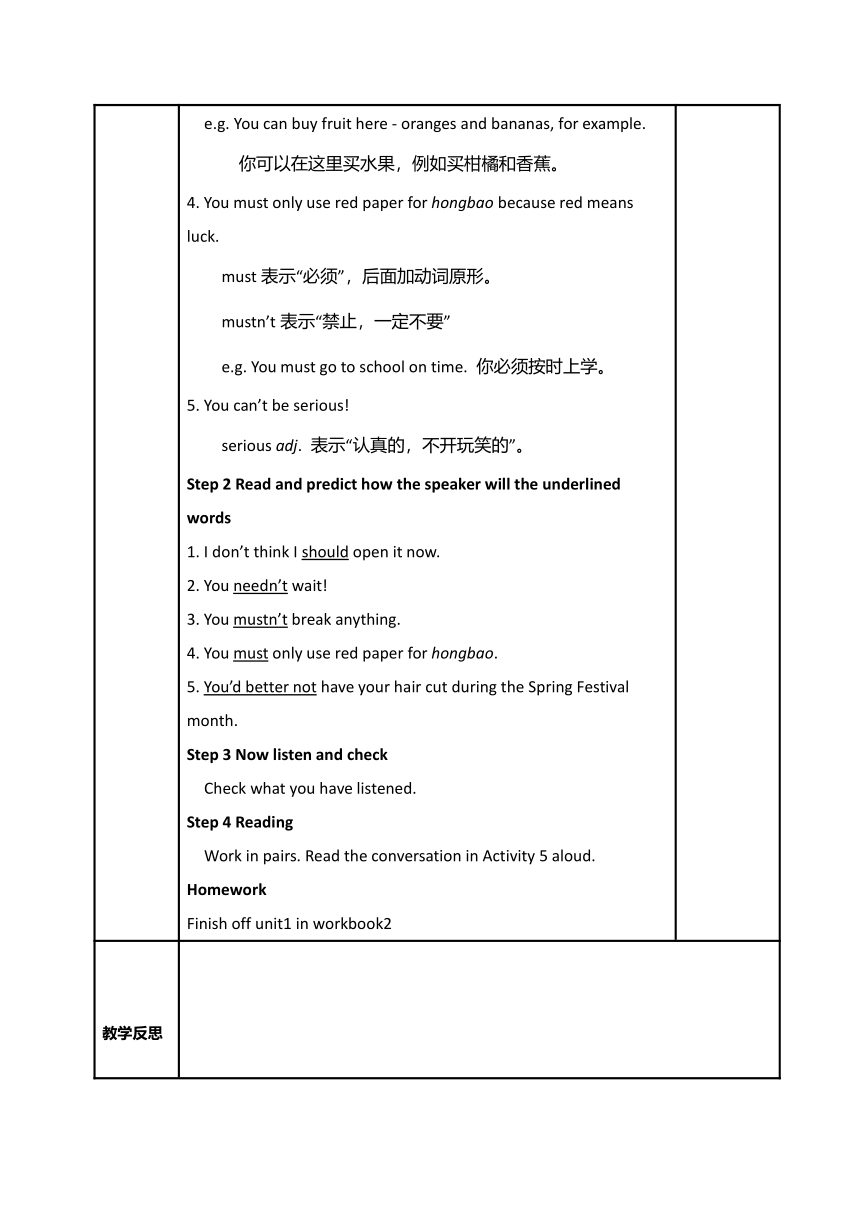
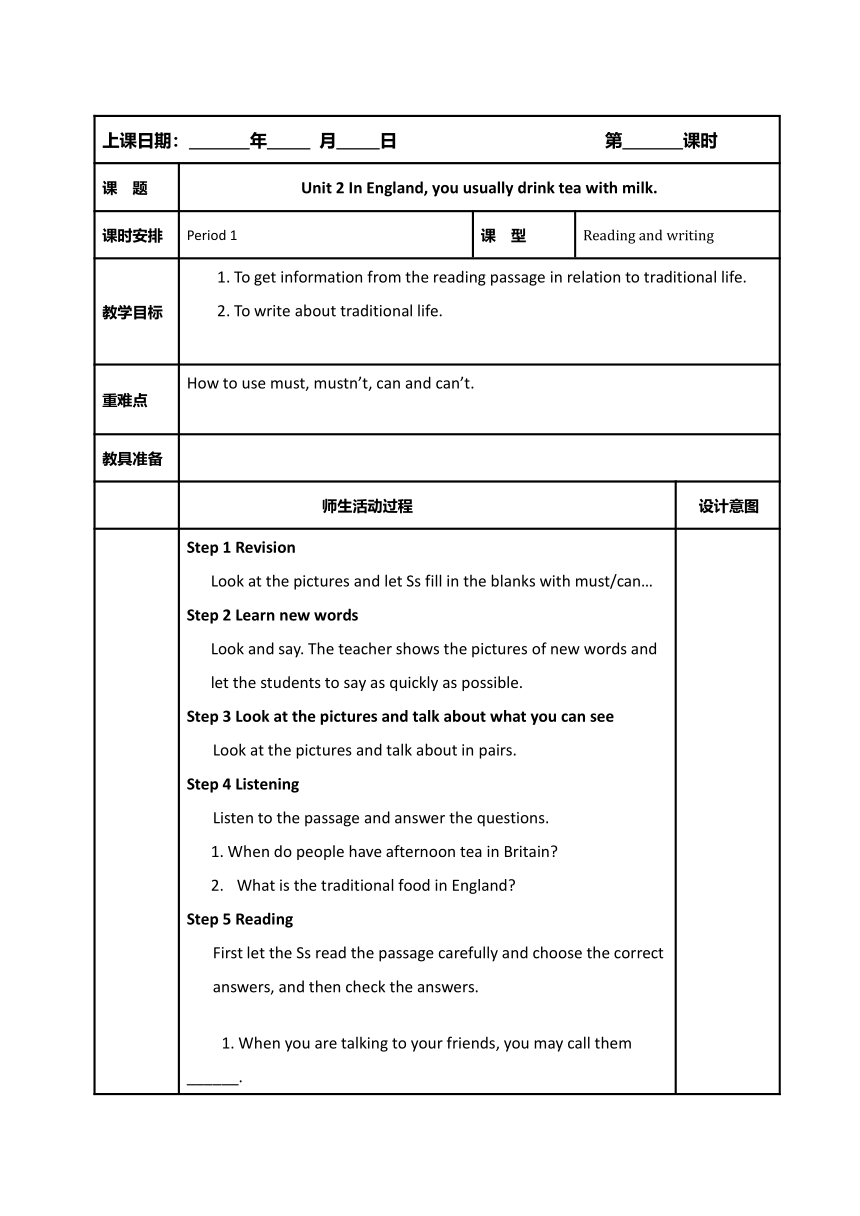
文档简介
上课日期: 年 月 日 第 课时
课 题 Module 11 Way of lifeUnit 1 In China, we open a gift later.
课时安排 Period 1 课 型 Listening&speaking
教学目标 To understand the conversation in relation to Traditional life.To get specific information from the listening material.To talk about and understand the verb: must, mustn’t, can, can’t.
重难点 1.New words and expressions.2. To learn the usage of must, mustn’t, can, can’t.
教具准备
师生活动过程 设计意图
Step 1 Lead-in Let students look at the pictures and guess the meaning of the words according to the sentence.Step 2 Learn new words Look and say. The teachers show the pictures of new words and let the students to say the new words as quickly as possible.Step 3 Listen and vocabulary1. Let students listen to the tape and number the words and expressions. Then check the answers.2. Read the words and expressions and choose the right pictures.3. Listen to the dialogue again and complete the table.Step 4 Listen and read1. Listen to Activity 1 and answer the question: 1) Why did Lingling think that she shouldn’t open her present immediately 2) What present do they want to buy for Lingling 2. Read quickly and choose the best answer for each sentence.3. Read and complete the table about different behaviour between China and the West.4. Read and check (√) what you usually do in China.1). Open a present immediately when you receive it.2). Accept a present with both hands.3). Use red paper for hongbao.4). Do cleaning on the first day of the Spring Festival.5). Break something during the Spring Festival.6). Have your hair cut during the Spring Festival month.5. List some Chinese traditions mentioned in the conversation:Step 5 Talking about Class RulesStep 6 Think about what you must and mustn’t/ can’t do in the situations. Write notes.Step 7 Complete the passage Read the passage and fill in the blanks with the correct form of the words.Step 7 A quiz in class.HomeworkFinish off unit 1 in workbook1
教学反思
上课日期: 年 月 日 第 课时
课 题 Module 11 Way of lifeUnit 1 In China, we open a gift later.
课时安排 Period 2 课 型 Listening&speaking
教学目标 Enable students to listen to and talk about things they must and mustn’t do.To get the student to know about the different tradition life in different countries.
重难点 To grasp the phrases and important sentences.
教具准备
师生活动过程 设计意图
Step 1 Language point1. What’s a surprise! surprise表示“惊奇,意外之事”。是名词。surprise还可以作动词,意为“使(某人)吃惊”。e.g. — Although he is only ten years old, he runs the fastest. — What a surprise! The story surprised us. 2. …we open a gift immediately. immediately adv. 立即;直接地 e.g. Mary answered Peter's letter immediately. 玛丽立即给彼得回了信。3. For example, in my hometown, people say you mustn’t do any cleaning on the first day of the Spring Festival. for example 例如 e.g. You can buy fruit here - oranges and bananas, for example.
你可以在这里买水果,例如买柑橘和香蕉。 4. You must only use red paper for hongbao because red means luck. must表示“必须”,后面加动词原形。 mustn’t表示“禁止,一定不要”e.g. You must go to school on time. 你必须按时上学。5. You can’t be serious! serious adj. 表示“认真的,不开玩笑的”。Step 2 Read and predict how the speaker will the underlined words1. I don’t think I should open it now.2. You needn’t wait!3. You mustn’t break anything.4. You must only use red paper for hongbao.5. You’d better not have your hair cut during the Spring Festival month.Step 3 Now listen and check Check what you have listened.Step 4 Reading Work in pairs. Read the conversation in Activity 5 aloud.HomeworkFinish off unit1 in workbook2
教学反思
上课日期: 年 月 日 第 课时
课 题 Unit 2 In England, you usually drink tea with milk.
课时安排 Period 1 课 型 Reading and writing
教学目标 1. To get information from the reading passage in relation to traditional life.2. To write about traditional life.
重难点 How to use must, mustn’t, can and can’t.
教具准备
师生活动过程 设计意图
Step 1 RevisionLook at the pictures and let Ss fill in the blanks with must/can…Step 2 Learn new wordsLook and say. The teacher shows the pictures of new words and let the students to say as quickly as possible.Step 3 Look at the pictures and talk about what you can see Look at the pictures and talk about in pairs.Step 4 Listening Listen to the passage and answer the questions.1. When do people have afternoon tea in Britain What is the traditional food in England Step 5 ReadingFirst let the Ss read the passage carefully and choose the correct answers, and then check the answers.1. When you are talking to your friends, you may call them ______. a) by their first names b) Mr or Mrs2. When you are invited for afternoon tea, you will have _____. a) tea 3. Tea in England usually has ______ in it. a) milk b) sugar4. ______ is traditional food in England. a) Steak and potatoes b) Fish and chips5. At the bus stop, it is important that you ______. a) wait in line b) smile politelyStep 6 PracticeWrite answers to the questions. Use the words from the box.1. What did Wang Hui notice when he was in England 2. What is one example of the English way of life 3. What do you eat for afternoon tea 4. How can you eat fish and chips 5. What do people do when they wait for the bus Homework Finish off unit2 in workbook1
教学反思
上课日期: 年 月 日 第 课时
课 题 Unit 2 In England, you usually drink tea with milk.
课时安排 Period 2 课 型 Reading and writing
教学目标 1.To write about traditional life.2.To get the student to know about the different tradition life in different countries.
重难点 To know about some language points.
教具准备
师生活动过程 设计意图
Step 1 Language points1. My experiences in England2. I enjoyed my stay, …stay作动词,可以表示“保持;停留”;还可以作名词,表示“逗留;停留”。如:Here are some ways for you to stay healthy. 3. For example, you must say Mr and Mrs when you meet someone for the first time.4. Afternoon tea is not just a drink but a light meal at around 4 pm.5. … or you can take it away and eat it with your fingers6. Once I noticed a gentleman touch a young man on the shoulder… Step 2 Writing1. Answer the questions about way of life in your home town.1. What do you do when you meet people for the first time 2. What must you say when you talk to older people 3. What food and drink do you give to visitors when they come to your home 4. What do you eat during the Spring Festival 2. Write a passage about ways of life in your home town. Use your answers in Activities 5 to help you.Step 3 GrammarTo master the usage of need/had better.need的用法need作为情态动词表示“需要”,可用于肯定句、否定句和疑问句。否定形式needn’t比较常用,表示“不需要”,或“不必要”。例如:had better的用法had better表示劝告或建议,意为“最好……”。例如:You’d better speak in a low voice. 你最好低点说话。had better一般不用于疑问句中,但可用于否定句中,其否定形式为:had better not.例如:You’d better not go out before you finish your homework.在完成你的家庭作业之前,最好不要出去。Step 4 ExercisesStep 5 HomeworkWrite a passage to describe what you should do at the bus stop.
教学反思
上课日期: 年 月 日 第 课时
课 题 Unit3 language in use
课时安排 Period 1 课 型 Revision and application
教学目标 To use the points in Units 1 and 2.To make Ss learn about the traditional life and how to respect the traditional life in other countries.
重难点 To master the word, the numbers and the article.
教具准备
师生活动过程 设计意图
Step 1 Revision Look at the pictures and guess the meaning. To master the structure of the grammar by filling the blanks.Step 2 Complete the sentences with can or can’tRead the sentences carefully.Fill in the blanks with can/can’t.Step 3 Complete the sentences with must or must notFill in the blanks with must/must not after Ss read the sentences carefully.School rules1. You _______ be late for school. 2. You _______ eat in the library. 3. You _______ ride your bike in the playground. 4. You _______ do your homework. 5. You _______ listen to the teacher.Keys: mustn’t mustn’t mustn’t must mustStep 4 Underline the correct words1. Read the passage carefully.2. Then underline the right words It’s important to know what you must and must not do when you meet people from a different country. You (1) may/ must not ask Westerners “How old are you ” because it’s not polite. You (2)might/ can know someone well, but you (3) must/ need not ask “How much money do you make ” He (4) may/ can never speak to you again! In public places, you (5) must/ can ask people before you take photos of them, and you (6) must not/ might not eat or drink in shops or museums. In some countries you (7) cannot/ can go into someone’s house with your shoes on. You (8) need not/ must not take them off. But in some countries you (9) might/ must not wear shoes in the house.Step 5 ListeningListen to a teenager talking about his life and check the things he must and mustn’t do.2. Listen again and answer the question: What two things does he say he can do HomeworkFinish off unit3 in the workbook.
教学反思
上课日期: 年 月 日 第 课时
课 题 Unit3 language in use
课时安排 Period 1 课 型 Revision and application
教学目标 1.To use the points in Units 1 and 2.2.To make Ss learn about the traditional life and how to respect the traditional life in other countries.
重难点 To master the word, the numbers and the article.
教具准备
师生活动过程 设计意图
Step 1 Writing Write some things you can, must and must not do at homeStep 2 Make a dialogueStep 3 Complete the passage with the words and expressions in the box.Step 4 Play a class gameChoose a word or an expression from the box and describe it to the class. Then the class guesses what it is.A: Many people have one.B: Is it a chess set A: No. You use it to get to places.C: Is it a bike A: Yes.Step 2 Around the worldTo know about the traditional presents.Traditional presents In the West, people often take flowers when they visit someone. Different flowers have different meanings. For example, people often give red roses to someone they love. In Greece, you must not give white flowers because that means that someone is dead.When you go to a foreign country, it is always best to check what people usually do, so you do not make a mistakes.Step 3 Writing 1. To write some advice for foreign visitors to a Chinese family.Think about the following questions:What must they wear What mustn’t they talk about What can’t they do What presents can they bring When must you arrive 2. Work in groups. Show the advice you wrote in Activity 9 to your group members. Choose the two best pieces of advices.3. Show the advice your group chose in Activity 10 to the whole class. Put the pieces of advice together to form your class advice.4. Send your advice to your foreign friends or paste it on your class blog.Step 4 Exercises Homework 请为学校新建的图书馆制定规章制度,写一篇60词左右的短文.
教学反思
for the first time meal meet
something interesting stand in a line take away
课 题 Module 11 Way of lifeUnit 1 In China, we open a gift later.
课时安排 Period 1 课 型 Listening&speaking
教学目标 To understand the conversation in relation to Traditional life.To get specific information from the listening material.To talk about and understand the verb: must, mustn’t, can, can’t.
重难点 1.New words and expressions.2. To learn the usage of must, mustn’t, can, can’t.
教具准备
师生活动过程 设计意图
Step 1 Lead-in Let students look at the pictures and guess the meaning of the words according to the sentence.Step 2 Learn new words Look and say. The teachers show the pictures of new words and let the students to say the new words as quickly as possible.Step 3 Listen and vocabulary1. Let students listen to the tape and number the words and expressions. Then check the answers.2. Read the words and expressions and choose the right pictures.3. Listen to the dialogue again and complete the table.Step 4 Listen and read1. Listen to Activity 1 and answer the question: 1) Why did Lingling think that she shouldn’t open her present immediately 2) What present do they want to buy for Lingling 2. Read quickly and choose the best answer for each sentence.3. Read and complete the table about different behaviour between China and the West.4. Read and check (√) what you usually do in China.1). Open a present immediately when you receive it.2). Accept a present with both hands.3). Use red paper for hongbao.4). Do cleaning on the first day of the Spring Festival.5). Break something during the Spring Festival.6). Have your hair cut during the Spring Festival month.5. List some Chinese traditions mentioned in the conversation:Step 5 Talking about Class RulesStep 6 Think about what you must and mustn’t/ can’t do in the situations. Write notes.Step 7 Complete the passage Read the passage and fill in the blanks with the correct form of the words.Step 7 A quiz in class.HomeworkFinish off unit 1 in workbook1
教学反思
上课日期: 年 月 日 第 课时
课 题 Module 11 Way of lifeUnit 1 In China, we open a gift later.
课时安排 Period 2 课 型 Listening&speaking
教学目标 Enable students to listen to and talk about things they must and mustn’t do.To get the student to know about the different tradition life in different countries.
重难点 To grasp the phrases and important sentences.
教具准备
师生活动过程 设计意图
Step 1 Language point1. What’s a surprise! surprise表示“惊奇,意外之事”。是名词。surprise还可以作动词,意为“使(某人)吃惊”。e.g. — Although he is only ten years old, he runs the fastest. — What a surprise! The story surprised us. 2. …we open a gift immediately. immediately adv. 立即;直接地 e.g. Mary answered Peter's letter immediately. 玛丽立即给彼得回了信。3. For example, in my hometown, people say you mustn’t do any cleaning on the first day of the Spring Festival. for example 例如 e.g. You can buy fruit here - oranges and bananas, for example.
你可以在这里买水果,例如买柑橘和香蕉。 4. You must only use red paper for hongbao because red means luck. must表示“必须”,后面加动词原形。 mustn’t表示“禁止,一定不要”e.g. You must go to school on time. 你必须按时上学。5. You can’t be serious! serious adj. 表示“认真的,不开玩笑的”。Step 2 Read and predict how the speaker will the underlined words1. I don’t think I should open it now.2. You needn’t wait!3. You mustn’t break anything.4. You must only use red paper for hongbao.5. You’d better not have your hair cut during the Spring Festival month.Step 3 Now listen and check Check what you have listened.Step 4 Reading Work in pairs. Read the conversation in Activity 5 aloud.HomeworkFinish off unit1 in workbook2
教学反思
上课日期: 年 月 日 第 课时
课 题 Unit 2 In England, you usually drink tea with milk.
课时安排 Period 1 课 型 Reading and writing
教学目标 1. To get information from the reading passage in relation to traditional life.2. To write about traditional life.
重难点 How to use must, mustn’t, can and can’t.
教具准备
师生活动过程 设计意图
Step 1 RevisionLook at the pictures and let Ss fill in the blanks with must/can…Step 2 Learn new wordsLook and say. The teacher shows the pictures of new words and let the students to say as quickly as possible.Step 3 Look at the pictures and talk about what you can see Look at the pictures and talk about in pairs.Step 4 Listening Listen to the passage and answer the questions.1. When do people have afternoon tea in Britain What is the traditional food in England Step 5 ReadingFirst let the Ss read the passage carefully and choose the correct answers, and then check the answers.1. When you are talking to your friends, you may call them ______. a) by their first names b) Mr or Mrs2. When you are invited for afternoon tea, you will have _____. a) tea 3. Tea in England usually has ______ in it. a) milk b) sugar4. ______ is traditional food in England. a) Steak and potatoes b) Fish and chips5. At the bus stop, it is important that you ______. a) wait in line b) smile politelyStep 6 PracticeWrite answers to the questions. Use the words from the box.1. What did Wang Hui notice when he was in England 2. What is one example of the English way of life 3. What do you eat for afternoon tea 4. How can you eat fish and chips 5. What do people do when they wait for the bus Homework Finish off unit2 in workbook1
教学反思
上课日期: 年 月 日 第 课时
课 题 Unit 2 In England, you usually drink tea with milk.
课时安排 Period 2 课 型 Reading and writing
教学目标 1.To write about traditional life.2.To get the student to know about the different tradition life in different countries.
重难点 To know about some language points.
教具准备
师生活动过程 设计意图
Step 1 Language points1. My experiences in England2. I enjoyed my stay, …stay作动词,可以表示“保持;停留”;还可以作名词,表示“逗留;停留”。如:Here are some ways for you to stay healthy. 3. For example, you must say Mr and Mrs when you meet someone for the first time.4. Afternoon tea is not just a drink but a light meal at around 4 pm.5. … or you can take it away and eat it with your fingers6. Once I noticed a gentleman touch a young man on the shoulder… Step 2 Writing1. Answer the questions about way of life in your home town.1. What do you do when you meet people for the first time 2. What must you say when you talk to older people 3. What food and drink do you give to visitors when they come to your home 4. What do you eat during the Spring Festival 2. Write a passage about ways of life in your home town. Use your answers in Activities 5 to help you.Step 3 GrammarTo master the usage of need/had better.need的用法need作为情态动词表示“需要”,可用于肯定句、否定句和疑问句。否定形式needn’t比较常用,表示“不需要”,或“不必要”。例如:had better的用法had better表示劝告或建议,意为“最好……”。例如:You’d better speak in a low voice. 你最好低点说话。had better一般不用于疑问句中,但可用于否定句中,其否定形式为:had better not.例如:You’d better not go out before you finish your homework.在完成你的家庭作业之前,最好不要出去。Step 4 ExercisesStep 5 HomeworkWrite a passage to describe what you should do at the bus stop.
教学反思
上课日期: 年 月 日 第 课时
课 题 Unit3 language in use
课时安排 Period 1 课 型 Revision and application
教学目标 To use the points in Units 1 and 2.To make Ss learn about the traditional life and how to respect the traditional life in other countries.
重难点 To master the word, the numbers and the article.
教具准备
师生活动过程 设计意图
Step 1 Revision Look at the pictures and guess the meaning. To master the structure of the grammar by filling the blanks.Step 2 Complete the sentences with can or can’tRead the sentences carefully.Fill in the blanks with can/can’t.Step 3 Complete the sentences with must or must notFill in the blanks with must/must not after Ss read the sentences carefully.School rules1. You _______ be late for school. 2. You _______ eat in the library. 3. You _______ ride your bike in the playground. 4. You _______ do your homework. 5. You _______ listen to the teacher.Keys: mustn’t mustn’t mustn’t must mustStep 4 Underline the correct words1. Read the passage carefully.2. Then underline the right words It’s important to know what you must and must not do when you meet people from a different country. You (1) may/ must not ask Westerners “How old are you ” because it’s not polite. You (2)might/ can know someone well, but you (3) must/ need not ask “How much money do you make ” He (4) may/ can never speak to you again! In public places, you (5) must/ can ask people before you take photos of them, and you (6) must not/ might not eat or drink in shops or museums. In some countries you (7) cannot/ can go into someone’s house with your shoes on. You (8) need not/ must not take them off. But in some countries you (9) might/ must not wear shoes in the house.Step 5 ListeningListen to a teenager talking about his life and check the things he must and mustn’t do.2. Listen again and answer the question: What two things does he say he can do HomeworkFinish off unit3 in the workbook.
教学反思
上课日期: 年 月 日 第 课时
课 题 Unit3 language in use
课时安排 Period 1 课 型 Revision and application
教学目标 1.To use the points in Units 1 and 2.2.To make Ss learn about the traditional life and how to respect the traditional life in other countries.
重难点 To master the word, the numbers and the article.
教具准备
师生活动过程 设计意图
Step 1 Writing Write some things you can, must and must not do at homeStep 2 Make a dialogueStep 3 Complete the passage with the words and expressions in the box.Step 4 Play a class gameChoose a word or an expression from the box and describe it to the class. Then the class guesses what it is.A: Many people have one.B: Is it a chess set A: No. You use it to get to places.C: Is it a bike A: Yes.Step 2 Around the worldTo know about the traditional presents.Traditional presents In the West, people often take flowers when they visit someone. Different flowers have different meanings. For example, people often give red roses to someone they love. In Greece, you must not give white flowers because that means that someone is dead.When you go to a foreign country, it is always best to check what people usually do, so you do not make a mistakes.Step 3 Writing 1. To write some advice for foreign visitors to a Chinese family.Think about the following questions:What must they wear What mustn’t they talk about What can’t they do What presents can they bring When must you arrive 2. Work in groups. Show the advice you wrote in Activity 9 to your group members. Choose the two best pieces of advices.3. Show the advice your group chose in Activity 10 to the whole class. Put the pieces of advice together to form your class advice.4. Send your advice to your foreign friends or paste it on your class blog.Step 4 Exercises Homework 请为学校新建的图书馆制定规章制度,写一篇60词左右的短文.
教学反思
for the first time meal meet
something interesting stand in a line take away
同课章节目录
- Module 1 How to learn English
- Unit 1 Let's try to speak English as much as possi
- Unit 2 You should smile at her.
- Unit 3 Language in use .
- Module 2 My home town and my country
- Unit 1 It's taller than many other buildings.
- Unit 2 Cambridge is a beautiful city in the east o
- Unit 3 Language in use .
- Module 3 Sports.
- Unit 1 Nothing is more exciting than playing tenni
- Unit 2 This year we training more carefully.
- Unit 3 Language in use .
- Module 4 Planes, ships and trains .
- Unit 1 He lives the farthest from school.
- Unit 2 What is the best way to travel.
- Unit 3 Language in use .
- Module 5 Lao She Teahouse.
- Unit 1 I wanted to see the Beijing Opera.
- Unit 2 It descibes the changes in Chinese society.
- Unit 3 Language in use .
- Module 6 Animals in danger.
- Unit 1 It allows people to get closer to them .
- Unit 2 The WWF is working hard to save them all.
- Unit 3 Language in use .
- Revision module A
- Module 7 A famous story
- Unit 1 Alice was sitting with her sister by the ri
- Unit 2 She was thinking about her cat.
- Unit 3 Language in use .
- Module 8 Accidents
- Unit 1 While the car were changing to red, a car s
- Unit 2 I was trying to pick it up when it bite me
- Unit 3 Language in use .
- Module 9 Population
- Unit 1 The population of China is about 1.37 billi
- Unit 2 Arnwick was a city with 200,000 people.
- Unit 3 Language in use .
- Module 10 The weathe
- Unit 1 It might snow.
- Unit 2 The weather is fine all year round.
- Unit 3 Language in use .
- Module 11 Way of life
- Unit 1 In China ,we open a gift later.
- Unit 2 In England, you usually drink tea with milk
- Unit 3 Language in use .
- Module 12 Help
- Unit 1 What should we do before help arrives?
- Unit 2 Stay away from windows and heavy furniture.
- Unit 3 Language in use .
- Revision module B
